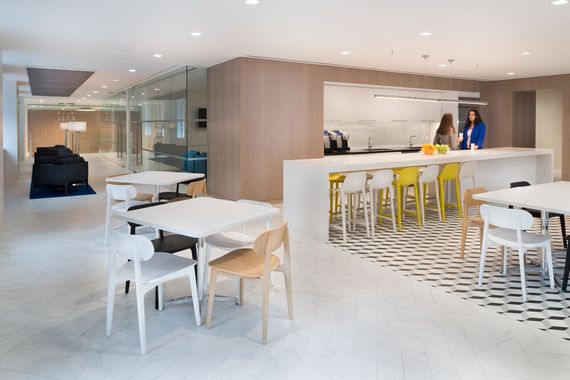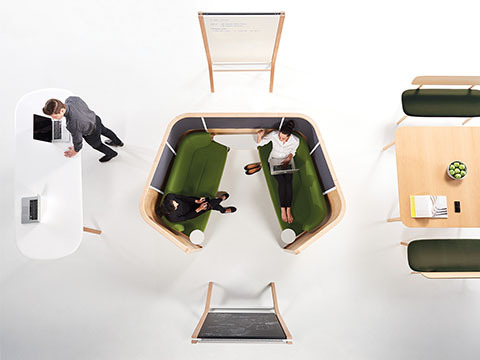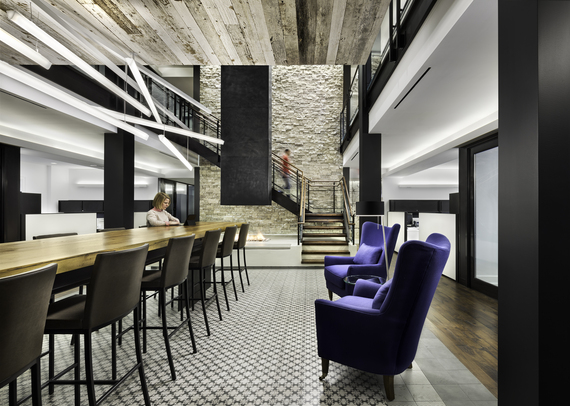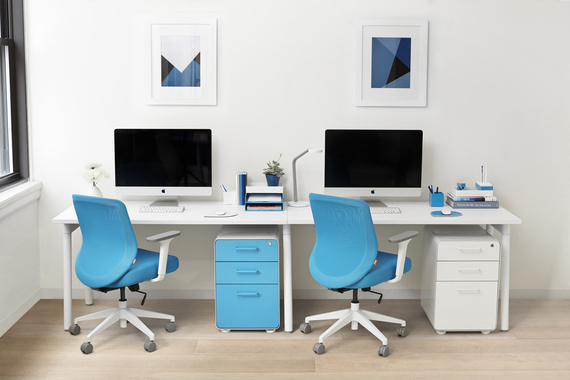As millennials continue to progress in their careers, the workplace conversation is already turning - designers are starting to plan for a new crop of young workers with divergent needs: Generation Z. With the first of this generation less than a year into their careers, the workplace community is mostly guessing. We are still figuring out how changes driven by the Millennial generation take form in physical space. That said, furniture makers, prepare: as Gen Z enters the office, more change is on the horizon. So, who is Generation Z and what types of offices will they need to succeed ... and, perhaps more importantly, how will these changes continue to impact the contract furniture industry? We spoke with several industry veterans to explore this topic.
The pace of change will accelerate.
Perhaps the biggest change that Millennials drove was the conversation of change itself. Stephanie Douglass, Director of Workplace Strategy at Teknion, says, "The fact that we are talking about them so much tells us that this generation continues to have specific impact on the workplace. Millennials are not as beholden to the way things have been done. They bring a different perspective and introduce new technology tools and different avenues for social communication and creation. This conversation will likely continue with Gen Z." Scott Lesizza, Principal at Workwell Partners, adds, "I have seen more change in our industry in the past two to three years than ever. Because most workspaces are built for a 10-year lifespan, much conversation is still around attracting Millennials, but as we look ahead to Gen Z, many characteristics overlap. Open plan, more accessibility to managers, quiet nooks in open spaces, and wellness in the workplace. Some of that has already been addressed, but it will get more drastic as time goes on."
Most would agree that Contract Furniture is an industry that has not evolved much since the inception of the cubicle in the 1980s either in buying process or product model; however, with new generations demanding more, quicker, easier, and cheaper, this will continue to push change in the industry at an ever increasing pace.
Manufacturer product mixes will expand. Dealer models will shift.
One of the known characteristics of Gen Z is that they are easily distracted. They have been raised with multiple stimuli since they were 3 years old, including TV's, iPads, smart phones, and more. Lesizza says, "In a space planning sense that will lead to Gen Zers needing places they can focus. I don't think we will see a shift away from open spaces. Many generations are used to working untethered, from wherever they want Gen Zers will need spaces within open areas to work on their own or within small groups so that they are not distracted. We will see more minimalist spaces. Spaces were becoming busier with screens, ping pong, etc... there will be a reverse against that and spaces will be beautiful, more open, natural with less distractions."
This will require contract furniture manufacturers to provide even more selection and choice from which designers, space planners, and end users can select to provide these spaces. However, it's also causing complexity in our traditional supply channels. Lesizza says, "One of the most dramatic shifts our industry has seen is in the buying process. It used to be that clients would partner with systems manufacturers and a corresponding dealer, then chose products. Very quickly the opposite is becoming true. They still pick a main line manufacturer, but I'd say 20-25% is now from the major and the rest is ancillary. That's literally 80% of our business now. Very often it's 50+ manufacturers that we are accommodating on one project. We still help design and layout space and recommend the best furniture for the most appropriate areas, but now we are managing the process of furniture because it has become so complex. That has been drastic over the past couple of years. The dealers that have not adapted to this new model won't survive."
The view of the traditional office will change immensely.
The office will probably never go away, but our view of it may be very different. Regardless of generation, we have all experienced that all of our work is available to us on devices wherever (and whenever) we are. Gen Z will likely push the concept of work life balance even further, which may ultimately change the perception of workplace. Jeff Miller, VP of Design at Poppin, says, "Companies will always need to hew to some corporate idea that they have an office. There is still a strong value to a physical sense of place - but what we interact with from office space to furniture itself will likely change drastically. There's already a premium put on spaces that are more flexible, different, open, large, with interesting architectural and furniture elements. Exploration is still being done around the juxtaposition of indoor/outdoor, play/extracurricular, and new types of café-like settings. That's probably a trend that has been going on for a decade now, but with interconnectivity, workers can now work from different locations and still connect with people, which changes their needs for architectural space."
We are already seeing inklings of change with the rise of coworking and new, more flexible work arrangements. The workplace is becoming a "flies to honey" approach where the best workplaces are so über-functional, it becomes a place that workers want and choose to go, because they still want face-to-face, human connection and find themselves more productive there. Furniture will need to support that productivity.
As technology gets more complex, furniture will continue to get simpler.
Contract furniture has historically taken the technologically-agnostic view because furniture is seen as a long-term investment, but technology changes rapidly. However, as the pace and scope of change with technology products continues to expand, it is simplifying what is required by physical space to support it. Miller says, "As a product designer, I have been part of research to identify new ways of working and re-envision the ways that people do their work. As technology becomes ubiquitous, slimmer, lighter, and less tethered, in the end it comes down to simple elements; a desk, chair, and storage. It comes down to making great, light, affordable, comfortable, quality furniture rather than being specific and task oriented."
Douglass adds, "While it is important to take tech into consideration, it is also super tricky... because we don't know for certain what the next big technology disruptor will be. Furniture is getting simpler as technology is getting more complex. We are designing furniture to balance technology, including a focus on natural materials, rounded organic shapes, and a return to biophillic influence."
Miller continues, "Technology, putting power in as many places as you wouldn't have thought to do it is a first checkmark, but in my lifetime I predict we will see it expand much further. We will only have bigger, higher resolution screens that will be integrated. We won't need a screen on a desk as much as a piece of glass that can turn into a screen. The future won't be so much about sitting at your desk at a computer or even picking up your laptop. I had a unique and powerful experience recently with virtual reality recently. They were showcasing a bunch of new software and experiences. It is probably imminent that everyone will work with goggles soon enough. How will that impact where people design? Will you need to sit at a desk at all? That will really reshape how people work and live."
In many ways, this focus on technology may drive furniture components to become simpler; however, we are already seeing how manufacturers are starting to get creative with furniture as architecture: creating new types of spaces, cocoons, and retreats that help workers "feel" differently in the same types of spaces. The future of product development for coming generations will likely be beautiful, simple furniture elements that adapt with technology, coupled with explorations of creating spaces with different psychological effects.
Retail purchases will continue to invade contract furniture projects.
Douglass says, "As we look to Generation Z, they will likely be more pragmatic than Millennials in terms of their expectations for the workplace. Here's why: They have already lived through two recessions, which shapes how they think about resource utilization. This coupled with their intense technological connectivity will strongly affect how they make decisions. I think they are going to be savvier consumers because they are used to having so much information at their fingertips." This "pragmatism" is likely to push a trend that is already starting in contract furniture where retail purchases are invading contract projects. While quality questions still need to be addressed, new generations of furniture purchasers will continue to demand retail aesthetics and transparent, easy ordering processes.
Lesizza says, "There's an Amazon and Uber mentality that I see shifting over to the client side. The client expects that they can get everything with a click of a button. They don't understand that when we pick fabrics and finishes it can take up to 12 weeks. Very often clients are asking us for things from West Elm, Design Within Reach, and Restoration Hardware because they have seen it in people's homes and they are trying to create workspaces that are as comfortable as homes. There are now contract divisions of retail companies to answer that demand." This increase in awareness of our industry will evolve how clients purchase.
Lesizza continues, "It used to be that Contract Furniture was a small world, and no one outside knew anything about it. Now it's online. Customers are much more educated than they were even 4-5 years ago, but what those consumers don't know is that they are not getting the same discount as they would through a contract dealer. When you have 50 different manufacturers all on the same order, what's to stop someone from building a website where people can place that order? There will be a shift toward being able to buy multiple manufacturer products online. It is up to furniture dealers to prove their value in managing this process."
Despite all of these predictions, Douglass encourages us to take everything with a big grain of salt and use caution as we talk of generations in the workplace. A lot is yet to be determined when it comes to forces shaping the generations. Teknion recently participated in a panel at NeoCon around Generations in the Workplace with panelists spanning from their 60s to their 20s. Douglass says, "Right now the conversation is focused on the new people coming into the workforce, but as we live longer, 65 is no longer the typical retirement age. What becomes really important is the interaction between generations. How do we transfer knowledge? What changes in the physical environments can help that happen? New people get the attention, but don't forget everyone else in the mix."
Note: This article was originally published in Workplaces Magazine, a publication by Bellow Press, on November 1, 2016. It is republished here with permission.
About the author: Amanda Schneider is a trends researcher, blogger for the Huffington Post, and the founder of Contract Consulting Group www.contractconsultinggroup.com, a consulting practice serving the Contract Interiors Industry focused on business strategy, market research, and marketing content development.



